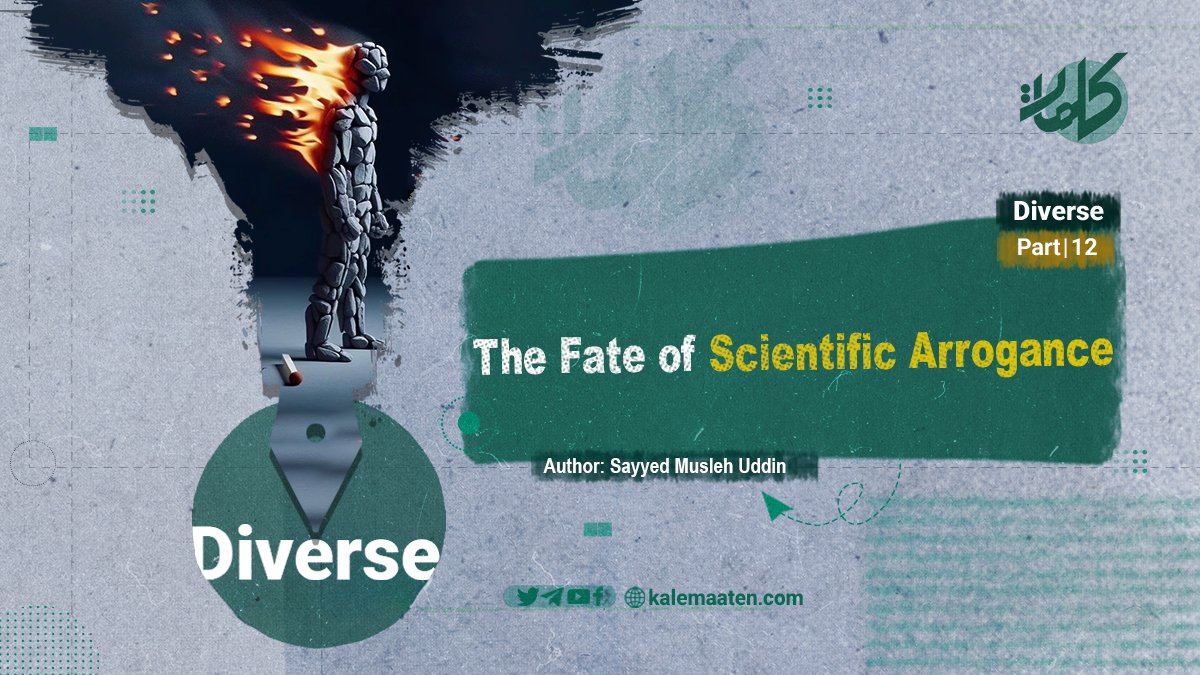Author: Sayyed Musleh Uddin
The Fate of Scientific Arrogance (Part 12)
The Story of Junaid al-Baghdadi (May Allah Bless Him):
A person served Junaid al-Baghdadi (MABH) for twenty years, and one day he stated that he had not learned anything during this time, even though he was a prominent figure among his people. Junaid (MABH) realized that he was suffering from arrogance and pride. He told him, “Do something: take a bag of walnuts and announce in front of the Khaniqah (Sufi lodge) that whoever throws a shoe at you will receive one walnut as a reward, and whoever throws two shoes will receive two walnuts. Continue like this until the bag becomes empty, and then come to me!” The person replied, “La ilaha illallah Muhammad Rasulullah (There is no god but Allah; Muhammad is the messenger of Allah). I can never do such a thing!” Junaid (MABH) said, “This is the same blessed Kalima that, if a seventy-year-old disbeliever says it from the bottom of his heart, by Allah, he becomes a believer; but with this statement, you have become a disbeliever in the Tariqah. Get out, you will never learn anything from me!”
Another one of the great figures was mentioned: a person was present with him for a long time and one day complained that his heart had not been formed. The Sheikh asked, “What is your purpose in being formed?” He replied, “I want to convey the blessings that I receive from you to others.” The Sheikh said, “All the problems start from this intention. You are already harboring the intention of becoming a master and guide. Get this vain thought out of your head and think like this: gratitude and servitude to Allah are obligatory upon us because of the numerous and various blessings that He has given us.”
Therefore, it is foolish and corrupt in intention to choose dhikr (remembrance of Allah), duties, and prayer in the hope that it will benefit us. What benefit and what reward? Allah has given us this existence, this body, these eyes, this nose, this ear, this tongue, and these senses. First, we must give thanks for them and then expect benefits and rewards. One who pretends to be humble is undoubtedly arrogant because claiming humility and pretending to be humble means believing in one’s own greatness, and that is arrogance.[1]
Imam Abu Hanifa (MABH) and the Arrogant Scholar:
During the time of Imam Abu Hanifah (MABH), a proud and arrogant scholar entered the city and proclaimed to the people that his intellect was so vast that he could answer even the most difficult of their questions. Among the gathering was Imam al-A‘zam Abu Hanifah (MABH), who said to the man, “I have a question for you, and I expect you to answer it correctly.” The scholar replied, “There is no problem — ask whatever you wish.” Imam Abu Hanifah (MABH) asked, “The ant that spoke with Prophet Sulayman (PBUH) — was it male or female?” The scholar, stunned by the question, said, “Only Allah knows that.” The Imam responded, “It was female.” The scholar asked, “What is your evidence for that? How do you know?” Imam Abu Hanifah (MABH) replied, “Because Allah the Exalted says in the Qur’an: (قالت نملةٌ)— ‘The ant said’ — and the verb قالت is in the feminine form.”
He then turned to the scholar and said, “My intention was not merely to ask you a question, but to show you that one should never be arrogant or prideful about one’s knowledge.”
And in this way, he cast down the man’s pride into the valley of humiliation and disgrace.
Umar ibn al-Khattab and Uprooting Arrogance:
Once, Umar ibn al-Khattab gathered the people in the mosque, then ascended the pulpit and said, “I remember when I was young; I used to herd the sheep of some women from the Banu Makhzum tribe in exchange for a handful of dates or raisins. And now, you call me the Commander of the Faithful (Amir al Momineen).” Then he came down from the pulpit.
Abdur-Rahman ibn Awf said, “What you did today was unusual. Your words surprised us, and you humbled yourself. What was the reason behind this?”
Umar replied, “My soul was overtaken by a little pride. It whispered to me, ‘Today you are the most prominent man in the Muslim world. You are called the Commander of the Faithful, and there is no one between you and Allah.’ I wanted to discipline it, remind it of the truth, and recall its past.”
During his caliphate, even after bringing the two great empires of the world to their knees, he would walk through the alleys of Madinah. Sometimes he would take the hand of a small child, give him a date, and say, “Say once: May Allah forgive Umar.” When he heard this prayer from the child’s mouth, he would say, “O Lord, by the blessing of this innocent child’s prayer, have mercy on Your sinful servant and forgive him.”
From the humility of soil, humanity grows.
Light disappears in arrogance like fire.
Iblis was cast away because of his pride.
Adam was accepted because of his repentance.
Adam became honored through seeking forgiveness.
Satan became disgraced through arrogance.
When the seed falls low, it is planted by hand.
But when the ear of grain rises high, it is cut down low.
Continues...
Previous Part/ Next Part
[1] – Ibid., p. 236.
[2] – Maqam al-Ilm wa ulama, p. 130.
[3] – Kanz al-Ummal, Part 2, p. 746.
[4] – Pandnamah al-Attar al-Nishaburi, Part 19 on expressing humility and abandoning self-sacrifice, No. 10.



